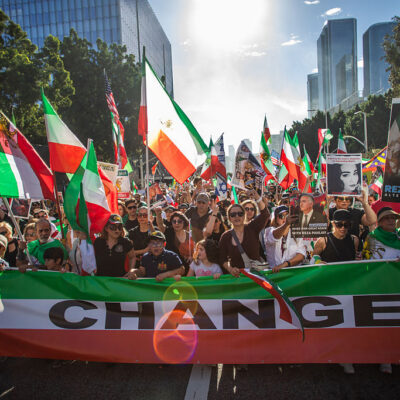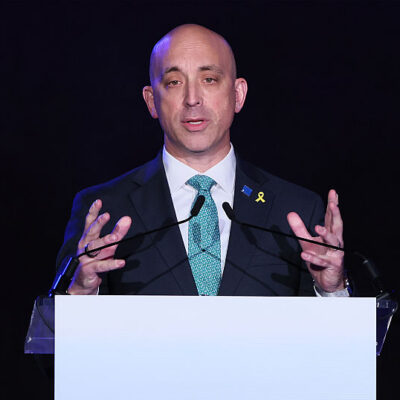Q&A
After Trump’s victory, what comes next for Jewish philanthropy?
Jewish Funders Network President and CEO Andrés Spokoiny speaks with eJewishPhilanthropy about a second Trump White House will be different from the first

Alex Wroblewski/Getty Images
A woman attends a rally on behalf of refugees in New York City in 2017.
After Donald Trump’s victory in 2016, many Jewish donors jumped to fund efforts that they believed would need additional support in light of the incoming administration, such as women’s, immigrant and racial justice groups. This time around, as a second Trump term looms, Jewish Funders Network President and CEO Andrés Spokoiny says their attention is likely to be fixed elsewhere.
Though he stressed that it is still too early to accurately predict, Spokoiny told eJewishPhilanthropy that he expects Jewish donors to maintain their focus on the war in Israel and combating antisemitism at home.
To get his initial assessments, eJP spoke with Spokoiny, who was openly critical of Trump during the campaign, on Wednesday about how a second Trump administration will affect Jewish philanthropy, from the causes that Jewish funders are likely to support to the effects of potential tax cuts.
The interview has been edited for clarity.
Judah Ari Gross: We’ve already seen a variety of responses from Jewish communal organizations to Trump’s election, from joy to terror, but most seem to be saying that they welcome working with the incoming administration. What do you see as the initial impact on the field of Jewish philanthropy?
Andrés Spokoiny: First, it’s really too early to tell.
The previous Trump administration saw a diversion of resources to “secular causes”: voting rights, reproductive freedom, stuff of that sort.
I would assume that we will also see some of that this time, but I would be surprised if it is in the same dimension or at the same level.
Antisemitism and the situation in Israel are still top of mind [for many funders].
JAG: Could some of that also be out of regret for how the organizations that were funded after 2016 have responded to the war in Israel and rising antisemitism in the U.S.? Disappointment over how some reproductive groups, such as the D.C. Abortion Fund, and others have been critical of Israel or dismissive of Jewish concerns?
AS: That may play a role. Many [funders] sympathize with those causes, but, given the situation, it may be hard for them to find the right partners. I think that may be an issue here. People may want to fund these things, but will they find the right partners?
But people can only split their attention so many ways, and [the war in Israel] is still going to capture the attention of a lot of American Jews.
I think the [concerns about the] future of democracy is going to be interesting and important for funders, but I don’t know what shape it will take. I think a lot will depend on how the new administration shapes up.
There’s no indication of what they stand for in terms of the Jewish community. Even in terms of women’s rights, they made contradictory promises as well.
It is hard to know how much urgency people are going to feel to fund the ‘other’ [non-Jewish] stuff.
The [Jewish] community is anyway in the process of hunkering down and focusing on its own, I think that this may continue.
JAG: On the antisemitism side, is it possible that funders will shift their priorities now? Over the past year, there has been such a focus on combating left-wing antisemitism and antisemitism on college campuses, is it possible that with a Republican administration in place, funders will see that as an area that they don’t have to concentrate on as much?
AS: It’s too early to tell. The government is limited in what it can do [on that front]. A lot of that is up to the courts.
It remains to be seen whether there’s going to be a need for less money in terms of progressive antisemitism, but I doubt it. If there is, it’s because things ebb and flow — not because of anything the government does.
In terms of right-wing antisemitism, it will depend. If we see Trump empowering the far right and that having consequences for Jews, well, we will probably see more attention to that.
One thing I will say is that the field of organizations fighting antisemitism needs to shrink. It’s too big, there are too many organizations. But that would have had to happen regardless of who’s in the government.
JAG: On the financial and tax side of philanthropy, are there any expectations of how a second Trump administration will affect things? There were studies that came out this summer showing how the 2017 tax cuts for high earners caused a drop in philanthropic giving, for instance. There have also been calls to alter the tax implications of donor-advised funds.
AS: On the one hand, [Vice President-elect] J.D. Vance promised to crack down on endowments. We don’t know if he’s going to go through with that. He meant crack down on endowments on the left, but you can’t really do that without cracking down on the right. So my hunch is that he won’t do that.
The 2017 Trump tax cuts had a negative impact on philanthropic giving, especially for people who itemized [their tax returns]. When you lower taxes, there’s less of an incentive to give because you get less off. That’s the general idea.
On the other hand, Trump also facilitated the accumulation of these massive fortunes, which strengthened the “mega-donor” culture.
Generally speaking, lowering taxes results in less philanthropy, but we’ll see.
I do expect a crackdown on organizations perceived to be hostile to the regime.
Whether they’ll get away with it, that I don’t know, but I expect to see the administration try to throw the book at them.
JAG: You mean nonprofit groups like George Soros’ Open Societies Foundation or HIAS?
AS: Yes, I think that’s going to happen.

 Add EJP on Google
Add EJP on Google















